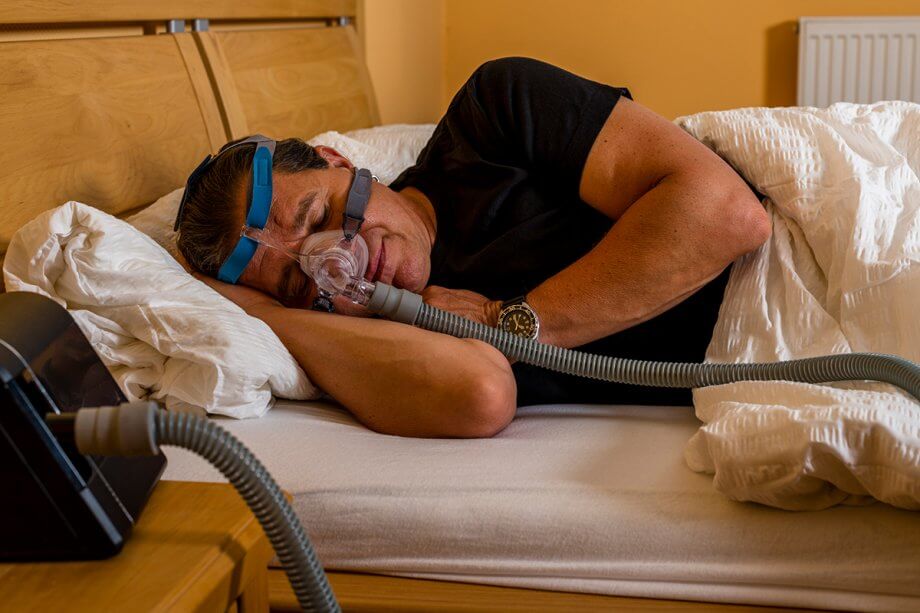At least 25 million adults in America suffer from sleep apnea, though experts suspect that millions of additional people suffer from the condition, but are not diagnosed. There are three types of sleep apnea. Of the three types, obstructive sleep apnea is the most common, and is often treated by dentists instead of physicians. Obstructive sleep apnea can put your overall health at risk, in addition to reducing your quality of life. Read on for everything to know about symptoms of sleep apnea, the risks of failing to seek treatment, and the types of treatment available.
What is Sleep Apnea?
Sleep apnea is a disorder in which a person starts and stops breathing while asleep. Obstructive sleep apnea is caused by relaxing muscles and tissues in the throat, which then obstruct your airway. The lack of oxygen causes the brain to wake you up enough to take a breath. This cycle of restricted air, brain signal, and waking up to breathe may happen 30 times or more per hour.
Central sleep apnea occurs when the brain fails to send proper messages to the muscles that are responsible for ensuring regular breathing. Complex sleep apnea is diagnosed when both the muscles relax, and the brain fails to send the proper signals to the muscles.
Is Sleep Apnea Dangerous for My Health?
Sleep apnea is a dangerous condition to leave untreated. Because the airway is restricted, or closes altogether, your body is not receiving the oxygen it requires for normal healthy function. This can lead to myriad symptoms, and increased risk for chronic and potentially fatal diseases and conditions such as:
- Chronic or excessive daytime fatigue
- Increase in blood pressure
- Increased risk of heart attack
- Increased risk of developing Type 2 diabetes
- Increased risk of Metabolic Syndrome
- Damage to the liver
- Increased risk of complications from medicine or surgery
Symptoms of Sleep Apnea
Many people are unaware that they are exhibiting symptoms of sleep apnea, until someone tells them. However, you may suspect sleep apnea if you routinely feel tired even after a full night’s rest. If you wake up in the night coughing or gasping, you should also suspect sleep apnea. You may also experience problems with concentration, shortness of breath, or headaches or dizziness upon waking.
If you notice any of these symptoms, you should schedule an appointment with your dentist. This is especially true if you have any of the known risk factors for obstructive sleep apnea such as:
- Obesity
- Anxiety
- Family history of sleep apnea
- Diagnosis of a deviated septum
- Enlarged tongue
- Age 40 or older
In other cases, you’ll be told of your symptoms by another person. They may say that you were snoring loudly, and then it appeared as if you were holding your breath. If you learn of these symptoms, you should schedule an appointment for treatment with a dentist who provides sleep apnea treatment.
Does Sleep Apnea Require Treatment?
Symptoms of sleep apnea should not be ignored due to the potential serious risk to your health. Fortunately, because the most common type of sleep apnea is due to a restricted airway, non-surgical treatments are often all that is needed to correct the condition, and protect your health.
Treatments for sleep apnea often include a combination of lifestyle changes and custom oral appliances that you wear while you sleep. The most common oral appliance is called a mandibular advancement device. A mandibular advancement device positions your lower jaw a bit forward to ensure the airway remains open.. Other less commonly used oral appliances include a tongue retaining device which prevents your tongue from blocking the airway.
Your dentist may also recommend lifestyle changes, such as losing weight, quitting smoking, stress reduction techniques to alleviate anxiety, and changing your sleep position.
If you have central or complex sleep apnea, you may be prescribed a CPAP machine by your physician. In severe cases, one of a variety of surgeries may be necessary.
Schedule an Appointment for Sleep Apnea Treatment on the UES
If you suspect that you’re suffering from a restricted airway when you sleep, schedule a consultation for obstructive sleep apnea treatment at Minoli & Vijay. Our experienced sleep dentists can help you confirm a diagnosis, and get you fitted for a custom sleep apnea mouth guard immediately. To book an appointment, send us a message or call 212-888-4140.

